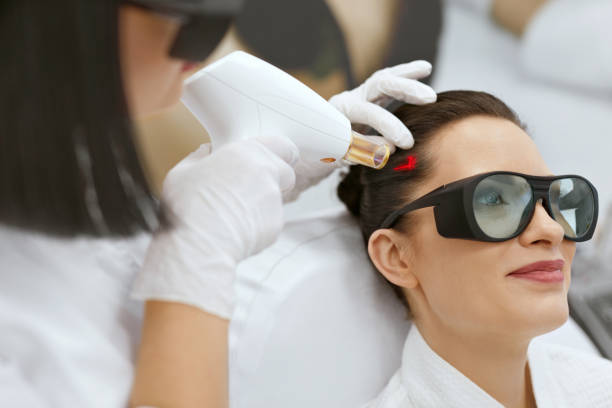Hair loss and thinning are common concerns affecting individuals of all ages and backgrounds. As the desire for effective, non-invasive solutions grows, many are turning to advanced treatments like Laser Hair Therapy in Dubai. This innovative approach harnesses the power of laser technology to stimulate hair follicles, promote growth, and improve hair density. But how exactly does laser hair therapy facilitate hair regrowth? Let’s explore the science, benefits, and process behind this cutting-edge treatment.
Understanding Hair Loss and the Role of Laser Therapy
What Causes Hair Loss?
Hair loss can stem from various factors, including genetics, hormonal imbalances, nutritional deficiencies, stress, and environmental influences. It often results in weakened hair follicles, reduced blood flow, and diminished cellular activity within the scalp. Addressing these underlying issues is crucial for effective hair restoration.
How Does Laser Hair Therapy Work?
Laser hair therapy utilizes low-level laser light to penetrate the scalp tissue. This process stimulates cellular activity within hair follicles, enhancing blood circulation and promoting healthier hair growth. The therapy aims to reactivate dormant follicles, strengthen existing hair strands, and create an optimal environment for new growth.
The Science Behind Laser Hair Therapy
Photobiomodulation and Cellular Stimulation
At the core of laser hair therapy is photobiomodulation—a process where specific wavelengths of light influence cellular functions. When applied to the scalp, these lasers energize the mitochondria in hair follicle cells, increasing ATP production. This boost in cellular energy accelerates growth cycles, repairs damaged follicles, and encourages thicker, healthier hair.
Improving Blood Circulation and Nutrient Delivery
Laser therapy enhances microcirculation within the scalp, ensuring vital nutrients and oxygen reach the hair follicles more effectively. Improved blood flow helps sustain follicle health, prolongs the growth phase of hair cycles, and reduces hair shedding.
Anti-Inflammatory Effects
Chronic inflammation can contribute to hair follicle damage and hair loss. Laser treatment has anti-inflammatory properties that can soothe the scalp, reduce swelling, and create a more favorable environment for hair regeneration.
Benefits of Laser Hair Therapy for Hair Growth
Non-Invasive and Painless Procedure
One of the primary advantages is its non-invasiveness. No surgical procedures or injections are involved, making it a comfortable option for many individuals. The treatment sessions are typically painless, with many experiencing a soothing, warm sensation.
Suitable for Various Types of Hair Loss
Laser therapy is effective across different types of hair thinning, including androgenetic alopecia (pattern baldness), diffuse thinning, and hair loss due to stress or nutritional deficiencies. Its versatility makes it a popular choice for a broad demographic.
Minimal Downtime and Convenient Sessions
Most sessions are brief, often lasting around 20-30 minutes, allowing for easy integration into busy schedules. Since there is little to no downtime, individuals can resume daily activities immediately after treatment.
Complementary to Other Hair Restoration Methods
Laser hair therapy can be used alongside other treatments such as topical medications or PRP (platelet-rich plasma) therapy for enhanced results. It can act as a supportive therapy to improve overall hair health and growth.
The Process of Laser Hair Therapy
Initial Consultation and Assessment
Before commencing treatment, a thorough scalp analysis is conducted to assess hair health, pattern of hair loss, and suitability for laser therapy. This step ensures personalized treatment planning aligned with individual needs.
Treatment Sessions
During the sessions, specialized laser devices are used to deliver controlled light energy to the scalp. The procedure involves multiple sessions over several weeks, with the frequency and duration tailored to each individual’s condition.
Post-Treatment Care
Post-treatment recommendations typically include maintaining scalp hygiene, avoiding harsh chemicals, and following a balanced diet to support hair growth. Patients are encouraged to adhere to the prescribed treatment schedule for optimal results.
Expected Outcomes and Timeline
Progressive Improvement Over Time
While some individuals may notice immediate scalp rejuvenation, significant hair growth improvements usually become visible after several months of consistent therapy. Patience and adherence to the treatment plan are key to achieving the desired results.
Long-Term Benefits
Regular maintenance sessions can sustain and enhance hair regrowth, prevent further loss, and improve overall hair quality. The therapy promotes a healthier scalp environment conducive to ongoing hair growth.
Who Should Consider Laser Hair Therapy?
Candidates for Laser Hair Therapy
Individuals experiencing early to moderate hair thinning, those seeking non-invasive solutions, or those who want to complement existing hair restoration methods may benefit from laser therapy. It is suitable for both men and women aiming to improve hair density and scalp health.
Not Suitable for Everyone
Though highly effective for many, certain conditions or severe hair loss cases may require alternative or additional treatments. Consulting a specialist can help determine if laser therapy aligns with your specific needs.
Conclusion
Laser Hair Therapy Dubai offers a scientifically-backed, non-invasive approach to stimulate hair growth and combat thinning. By leveraging the principles of photobiomodulation, it revitalizes dormant hair follicles, improves scalp health, and encourages natural hair regeneration. Whether used as a standalone treatment or combined with other methods, laser therapy provides a promising pathway toward fuller, healthier hair.
 WhatsApp Us Now
WhatsApp Us Now





